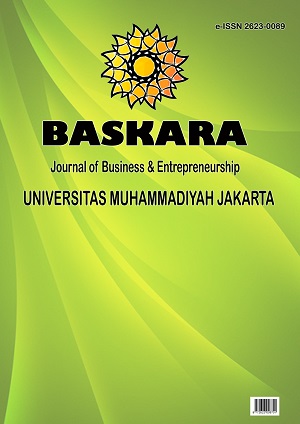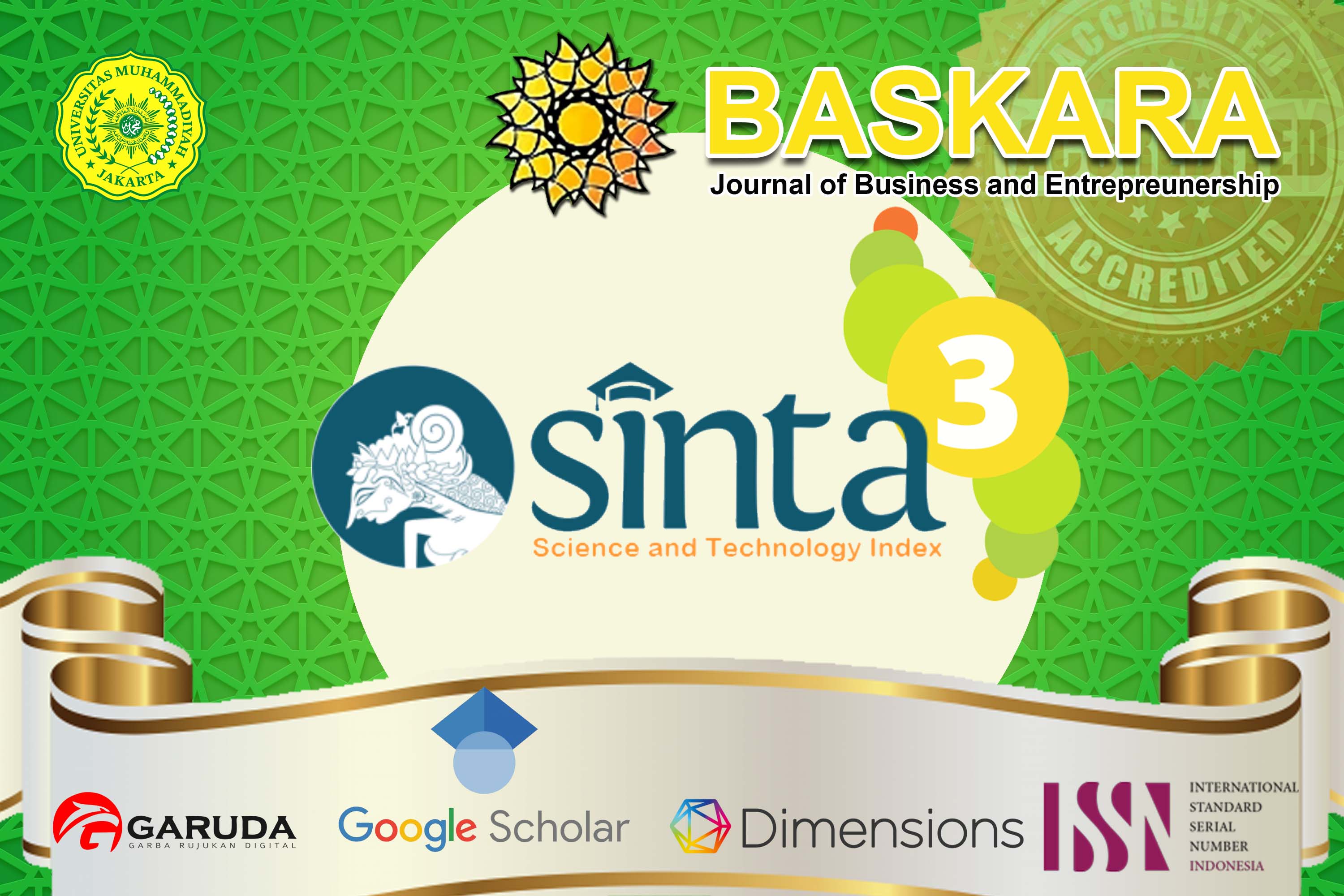Building Competitive Advantage through Innovation, Creativity, Product Quality
DOI:
https://doi.org/10.54268/baskara.v4i1.9702Keywords:
Competitive Advantage, Innovation, Creativity, , Product QualityAbstract
In the increasingly fierce competition, a business must have a strong enough competitiveness to be able to continue to compete with other businesses, especially similar businesses. It is very important for a business to make strategic steps to be able to continue to compete with competitors. This study aims to determine the effect of innovation, creativity and product quality on competitive advantage at Vibar Catering in Gunungpati. The data collection method in this study used a questionnaire by distributing questionnaires to 110 respondents. The sample in this study was some visitors who bought food and beverage products at Vibar Catering. The data analysis method used multiple linear regression, normality test, multicollinearity test, heteroscedasticity test, hypothesis test: t test, f test, and coefficient of determination test (R2). The results of this research found that product innovation variable (X1) t-count 4.742 > t-table 1.6592 and significant probability 0.000 <0.05, so that partially there is a positive and significant effect between Product Innovation (X1) on Competitive Advantage (Y). Product Creativity (X2) has a t-count of 2.536 > t-table 1.6592 and a significant probability of 0.000 <0.05, so that partially there is a positive and significant effect between Product Creativity (X2) on Competitive Advantage (Y). Product Quality (X3) has t-count 2.982> t-table 1.6592 significant probability 0.000 <0.05, so that partially there is a positive and significant effect between Product Quality (X3) on Competitive Advantage (Y). Vibar Catering in Gunungpati, it is expected to improve Product Quality by providing reliable catering services in food and beverage products, because the Product Quality variable has the lowest regression coefficient among other variables. If product quality is improved, consumer confidence in the product will also increase.References
Bagaskara, T. Y. (2019). Pengaruh Inovasi Produk, Desain Produk dan Kualitas Produk Terhadap Keunggulan Bersaing Pada Produk Woodenway. Prodi Manajemen, Fakultas Ekonomi, Universitas Islam Indonesia.
Christian, J. (2017). Pengaruh Kualitas Produk dan Inovasi Produk Terhadap Keunggulan Bersaing pada Clothing Our Bandung Style. Bandung: Program Studi Manajemen, Fakultas Ekonomi dan Bisnis Universitas Komputer Indonesia.
Dismawan, R. (2013). Pengaruh Kreativitas dan Inovasi Produk Terhadap Keunggulan Bersaing Produk Kue Sus. Jurusan manajemen Ekonomi Universitas Komputer Indonesia.
Ghozali. (2016). Aplikasi Analisis Multivariete Dengan Program IMB SPSS. Semarang: Badan Penerbit Universitas Diponegoro.
Haryono, T., & Marniyati, S. (2017). Pengaruh Market Orientation, Inovasi Produk, dan Kualitas Produk terhadap Kinerja Bisnis Dalam Menciptakan Keunggulan Bersaing. Jurnal Bisnis dan Manajemen, 17(2).
Husein, U. (2003). Metode Riset Perilaku Konsumen Jasa. Jakarta: Ghalia Indonesia.
Hussain, M., & Ranabhat, P. (2013). Influence of Service and Product Quality on Customer Retention: A Swedish Grocery Store. University of Gävle, Sweden. Retrieved from http://www.divaportal.se/smash/get/diva 2:633168/FULLTEXT01.pdf.
Kotler, P., & Armstrong, G. (2008). Dasar-Dasar Pemasaran, Edisi kesembilan, Jilid 1, dialih bahasakan oleh Alexander Sindoro. Jakarta: Indeks.
Kurniasari, R. D. (2018). Pengaruh Inovasi Produk, Kreativitas Produk, dan Kualitas Produk terhadap Keunggulan Bersaing (Studi Kasus pada Produk Enceng Gondok "AKAR"). S1 Thesis. Universitas Negeri Yogyakarta.
Satyagraha, H. (1994). Keunggulan Bersaing dan Aliansi Strategis: Redefinisi SWOT. Usahawan, 4 (23).
Sugandini, D. (2012). Karakteristik Inovasi, Pengetahuan Konsumen, Kecukupan Informasi, Persepsi Resiko, dan Kelangkaan dalam Penundaan Adopsi Inovasi pada Masyarakat Miskin. Universitas Gajah Mada.
Sugiyono. (2013). Metode Penelitian Kuantitatif, Kualitatif dan R&D. Bandung: Alfabeta.
Sukarmen, P. (2013). Analisis Pengaruh Inovasi Produk terhadap Kepuasan Konsumen dengan Keunggulan Bersaing sebagai Variabel Intervening pada Produk Gula Pasir Sebelas (GUPALAS) Pabrik Gula Semboro PTP Nusantara (Persero). XII (1), 64-78.
Sutrasmawati, E. (2008). Pengaruh Kompetisi Produk Dalam Meningkatkan Kinerja Pemasaran Melalui Keunggulan Bersaing. Jurnal Bisnis dan Ekonomi (JBE).Vol. 15, No.2.
Yamit, Z. (2011). Manajemen Produksi & Operasi, Edisi Pertama. Yogyakarta: Ekonisia.
Zhang, Z. (1999). Developing an Instrument for Measuring TQM Implementation on a Chinese Context. Faculty of Management and Organisation, University of Groningen.
Downloads
Published
Issue
Section
License
In order for Baskara: Journal of Business and Entrepreneurship to publish and disseminate research articles, we need publishing rights (transfered from author(s) to publisher). This is determined by a publishing agreement between the Author(s) and Baskara Journal. This agreement deals with the transfer or license of the copyright of publishing to Baskara: Journal of Business and Entrepreneurship, while Authors still retain significant rights to use and share their own published articles. Baskara : Journal of Business and Entrepreneurship supports the need for authors to share, disseminate and maximize the impact of their research and these rights, in any databases.
As a journal Author, you have rights for a large range of uses of your article, including use by your employing institute or company. These Author rights can be exercised without the need to obtain specific permission. Authors publishing in Baskara : Journal of Business and Entrepreneurship have wide rights to use their works for teaching and scholarly purposes without needing to seek permission, including:
- use for classroom teaching by Author or Author's institution and presentation at a meeting or conference and distributing copies to attendees;
- use for internal training by author's company;
- distribution to colleagues for their reseearch use;
- use in a subsequent compilation of the author's works;
- inclusion in a thesis or dissertation;
- reuse of portions or extracts from the article in other works (with full acknowledgement of final article);
- preparation of derivative works (other than commercial purposes) (with full acknowledgement of final article);
- voluntary posting on open web sites operated by author or author’s institution for scholarly purposes.
Copyright Transfer Agreement for Publishing (Publishing Right)
The Authors who submit manuscript has to understand that if accepted for publication, mean that all copyright and publishing right of the article shall be assigned/transferred to Baskara: Journal of Business and Entrepreneurship as assigned publisher.
- CC BY-NC: This license allows reusers to distribute, remix, adapt, and build upon the material in any medium or format for noncommercial purposes only, and only so long as attribution is given to the creator.
It includes the following elements:
BY ![]() – Credit must be given to the creator
– Credit must be given to the creator
NC ![]() – Only noncommercial uses of the work are permitted
– Only noncommercial uses of the work are permitted
Baskara (C) Copyright (2022):
BASKARA: Journal of Business and Entrepreneurship by https://jurnal.umj.ac.id/index.php/baskara
is licensed under a Creative Commons Attribution-NonCommercial 4.0 International License








